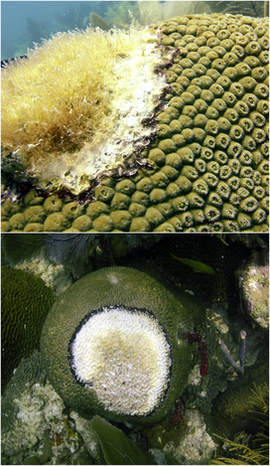Disease Susceptibility, Resistance, and Resilience in Caribbean Corals
|
Coral diseases have dramatically increased over the past 4 decades, with documented increases in the number of described diseases, geographic ranges, number of host species, and overall incidence. This project combines in situ monitoring data on coral disease prevalence, recurrence, and severity with targeted ex situ factorial experiments to understand why some coral species or individual colonies succumb to disease while others survive. Caribbean coral species, including Montastraea cavernosa and Orbicella faveolata, are being used as models to investigate a number of research questions. For example, is susceptibility to disease determined by coral and algal symbiont genotypes or driven primarily by environmental conditions? Are corals exposed to disease more likely to be resistant during subsequent exposures? Can we predict which corals are most likely to survive (or die) during disease outbreaks? Perhaps most important, can we alter management strategies to mitigate losses of corals to disease? Techniques to identify disease resistant/resilient corals are particularly advantageous for coral restoration efforts. Ecological disease data have been collected throughout the Caribbean while ex situ experiments have been focused in the Florida Keys and Lee Stocking Island, Bahamas. New molecular diagnostics have been developed in the Robertson Coral Reef Program. In response to the most recent scleractinian tissue loss disease outbreak in South Florida, the lab has partnered with multiple agencies and universities to determine the extent of impacts, track the fate of individual affected colonies, and test potential intervention strategies.
|

